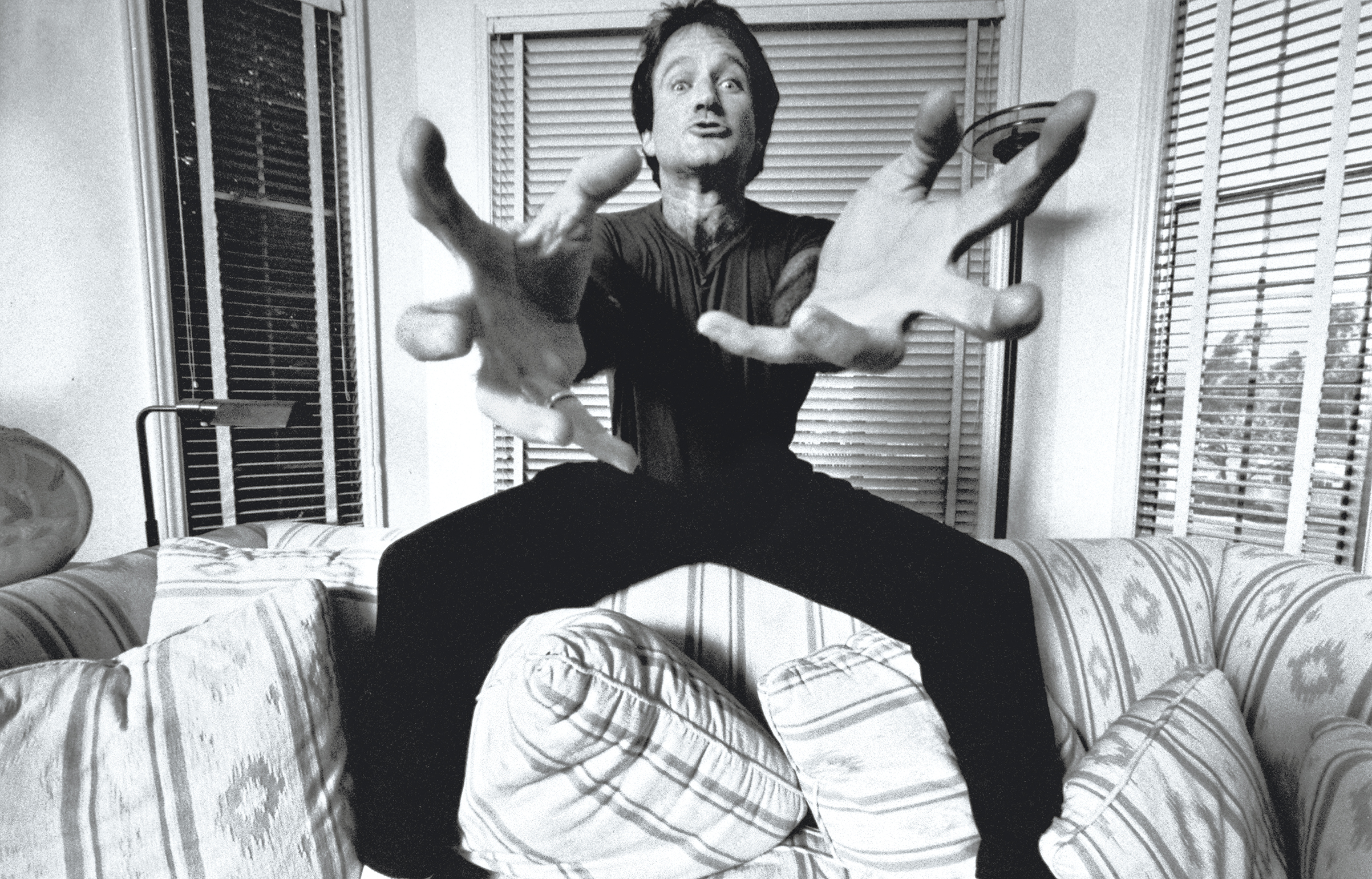What Did Robin Williams Have At The End Of His Life? Uncovering A Difficult Truth
Many people still remember Robin Williams with such fondness, thinking about his incredible talent and the sheer joy he brought to so many of us. His passing, you know, really hit a lot of us quite hard, leaving behind a big question mark for many who adored him. It’s almost, in a way, natural to wonder what exactly was happening with him during his final days, particularly given the suddenness and sadness of it all.
For someone who seemed to radiate so much light, the news of his death sparked a lot of conversations, and even some confusion, about what could have led to such a tragic outcome. People wanted to understand, and that, is that, a desire to grasp the full picture of a person’s struggles, especially when they are so beloved.
This article aims to shed some light on that very question: **What did Robin Williams have at the end of his life?** We’ll explore the medical condition that deeply affected him, offering some clarity and, perhaps, a deeper appreciation for the personal battles he was quietly fighting, you see.
- Sharon Case Net Worth
- Allyson Felix Net Worth
- Jermaine Oneal Net Worth
- Net Worth Of Nyjah Huston
- Les Twins Net Worth
Table of Contents
- Robin Williams: A Life in Brief
- Understanding Lewy Body Dementia: The Unseen Battle
- The Importance of Awareness
- Frequently Asked Questions (FAQs)
- A Legacy of Empathy and Understanding
Robin Williams: A Life in Brief
Robin McLaurin Williams was, in many respects, a true force of nature in the entertainment world. Born in Chicago, Illinois, on July 21, 1951, he grew up to become one of the most celebrated actors and comedians of his generation. His unique ability to improvise, his quick wit, and his incredible range of voices and characters just really captivated audiences around the globe, you know.
He brought laughter to millions with his stand-up comedy and iconic roles in films like "Mrs. Doubtfire," "Aladdin," and "Good Morning, Vietnam." Yet, he also moved us deeply with his dramatic performances, earning an Academy Award for Best Supporting Actor for "Good Will Hunting." It’s pretty clear he had a gift for both comedy and serious acting, truly a versatile performer, so.
His personal life, like many public figures, had its ups and downs, including struggles with addiction and depression, which he openly discussed at various points. These personal battles, in a way, added another layer to the public’s connection with him, making him seem all the more human and relatable, even with all his fame, you know.
- Joel Osteen Salary
- Net Worth Scotty Mccreery
- Net Worth Lil Jon
- Paul Rabil Net Worth
- Big Boi Outkast Net Worth
Personal Details and Biography
| Detail | Information |
|---|---|
| Full Name | Robin McLaurin Williams |
| Date of Birth | July 21, 1951 |
| Place of Birth | Chicago, Illinois, USA |
| Date of Passing | August 11, 2014 |
| Occupation | Actor, Comedian |
| Spouses | Valerie Velardi (m. 1978; div. 1988) Marsha Garces (m. 1989; div. 2010) Susan Schneider (m. 2011) |
| Children | Zachary Pym Williams Zelda Rae Williams Cody Alan Williams |
| Notable Awards | Academy Award for Best Supporting Actor (Good Will Hunting) Golden Globe Awards Grammy Awards Screen Actors Guild Awards |
| Known For | Stand-up comedy, "Mrs. Doubtfire," "Good Will Hunting," "Dead Poets Society," "Aladdin" |
Understanding Lewy Body Dementia: The Unseen Battle
So, **what did Robin Williams have at the end of his life**? The answer, as his wife Susan Schneider Williams later revealed, was Lewy Body Dementia, often called LBD. This is a very complex brain condition, and it's something that, honestly, many people don't know much about. It’s a progressive disease, meaning it gets worse over time, and it affects a person's thinking, movement, and even their sleep and mood, too.
LBD is a type of dementia associated with abnormal deposits of a protein called alpha-synuclein in the brain. These deposits, known as Lewy bodies, affect parts of the brain that control memory, thinking, and movement. It's a bit like a mix of Alzheimer's disease and Parkinson's disease symptoms, which can make it particularly challenging to identify correctly, you know.
The presence of these Lewy bodies disrupts normal brain function, leading to a wide range of symptoms that can fluctuate quite a bit, even from one day to the next. This unpredictability, apparently, makes it very difficult for both the person experiencing it and their loved ones to cope with, as I was saying.
The Symptoms Robin Experienced
Robin Williams, it turns out, was experiencing many of the distressing symptoms associated with LBD, though he and those around him didn't fully grasp what was happening at the time. His wife shared that he suffered from intense paranoia, vivid hallucinations, and significant anxiety, which were very much out of character for him. These are, in fact, common non-motor symptoms of LBD, so.
He also developed problems with movement, similar to Parkinson's disease, such as tremors and a shuffling gait. This aspect of LBD is often referred to as parkinsonism, and it can really impact a person's physical abilities and independence, you know. It's a condition that affects both the mind and the body, which makes it particularly cruel, you see.
Cognitive fluctuations were another major issue. One moment, his mind might seem clear, and the next, he could be disoriented or struggle with everyday tasks. This kind of variability, a bit like a switch being flipped, is a hallmark of LBD and can be incredibly frustrating and confusing for everyone involved, as a matter of fact.
The Challenge of Diagnosis
Getting a correct diagnosis for LBD is, unfortunately, quite a difficult journey for many, and Robin Williams's experience was no different. The symptoms can mimic other conditions, like Parkinson's disease or Alzheimer's, or even severe depression and anxiety. This makes it really hard for doctors to pinpoint LBD accurately, especially in the early stages, you know.
For a long time, Robin and his family were trying to figure out what was going on, with various doctors offering different ideas and treatments that weren't quite hitting the mark. It's almost as if they were chasing a ghost, trying to understand a condition that was slowly taking hold, but wasn't clearly identifiable, apparently. This period of uncertainty can be very distressing for families, as I was saying.
The definitive diagnosis of Lewy Body Dementia often requires an autopsy, which was the case for Robin Williams. This means that many individuals live with LBD without a proper diagnosis, making it harder to manage symptoms and plan for the future. It truly highlights the need for more research and better diagnostic tools, doesn't it?
Impact on Daily Life and Mental Well-being
Living with Lewy Body Dementia, as Robin Williams did, profoundly affects every aspect of a person's daily existence. The cognitive issues, like problems with attention and problem-solving, can make simple tasks feel overwhelming. Imagine, if you will, struggling to follow a conversation or remember where you put your keys, and that's just a small part of it, you know.
The hallucinations, which can be quite vivid and disturbing, can cause immense fear and confusion. For someone like Robin, whose mind was so active and creative, these visual disturbances must have been incredibly disorienting and frightening. It's a bit like living in a waking nightmare, in some respects, where your own mind plays tricks on you, so.
Beyond the physical and mental challenges, LBD also takes a heavy toll on a person's emotional and psychological well-being. Depression, anxiety, and apathy are common, and the loss of independence and identity can be incredibly painful. It’s a condition that chips away at a person, piece by piece, and it’s very, very tough to witness, you see. You can learn more about mental health conditions on our site.
The Importance of Awareness
Robin Williams's story, while deeply sad, has brought much-needed attention to Lewy Body Dementia. Before his passing, LBD was a relatively unknown condition to the general public, and even to many medical professionals. His family's openness about his diagnosis has helped to raise significant awareness, which is truly important, you know.
Increased awareness means more people might recognize the symptoms in themselves or their loved ones, leading to earlier diagnosis and better management of the condition. It also helps to reduce the stigma associated with dementia and other neurodegenerative diseases, making it easier for people to seek help and support. This kind of understanding can make a big difference, you see.
Foundations and organizations dedicated to LBD research and support have seen a rise in interest and funding since Robin Williams's story became public. This is crucial for advancing our understanding of the disease, finding better treatments, and eventually, a cure. It’s a very positive outcome from a very difficult situation, you know. You can find more information about Lewy Body Dementia from reputable sources, like the Lewy Body Dementia Association.
Frequently Asked Questions (FAQs)
People often have questions about Robin Williams's health and Lewy Body Dementia. Here are some common ones:
What were the early signs of LBD that Robin Williams experienced?
Apparently, early signs for Robin included increased anxiety, paranoia, and sleep disturbances, particularly vivid dreams. He also started experiencing movement problems, which were initially thought to be Parkinson's disease, but were actually part of the broader LBD picture, you know. These symptoms often appear before the more severe cognitive decline.
Is Lewy Body Dementia a common condition?
LBD is, in fact, considered the second most common type of progressive dementia after Alzheimer's disease, though it's still less recognized. It affects an estimated 1.4 million individuals and their families in the United States alone. So, it's not as rare as some might think, you see, but it often goes undiagnosed or misdiagnosed, as a matter of fact.
How is Lewy Body Dementia different from Alzheimer's disease?
While both are types of dementia, LBD and Alzheimer's have distinct features. LBD often involves prominent early motor symptoms (like Parkinson's), visual hallucinations, and significant fluctuations in alertness and attention. Alzheimer's, on the other hand, typically starts with memory loss as the most prominent symptom. The specific protein deposits in the brain are also different: Lewy bodies in LBD versus amyloid plaques and tau tangles in Alzheimer's, you know. Learn more about different types of dementia.
A Legacy of Empathy and Understanding
The story of **what did Robin Williams have at the end of his life** is, in a way, a powerful reminder of the hidden battles many people face. His struggle with Lewy Body Dementia brought this challenging condition into the public eye, sparking conversations that are very much needed. It really highlighted how crucial it is to understand and support those living with neurodegenerative diseases, and their families, too.
Robin Williams left behind an amazing body of work that continues to bring joy and thought to people around the world. Beyond his artistic contributions, his personal story, tragically, has also become a catalyst for greater awareness and empathy for brain health conditions. His legacy, it seems, now includes helping us all to look a little closer, and with more compassion, at the invisible struggles others might be enduring, you know.
- Net Worth Of Nickelback
- Allyson Felix Net Worth
- Alex De Lesseps
- Net Worth Of Jordan Belfort
- Jim Bob Duggar Net Worth

Robin Williams images Robin Williams HD wallpaper and background photos

Robin Williams - Robin Williams Photo (32089812) - Fanpop

HBO’s Robin Williams Doc Peeks Inside the Late Star's Mind | TIME